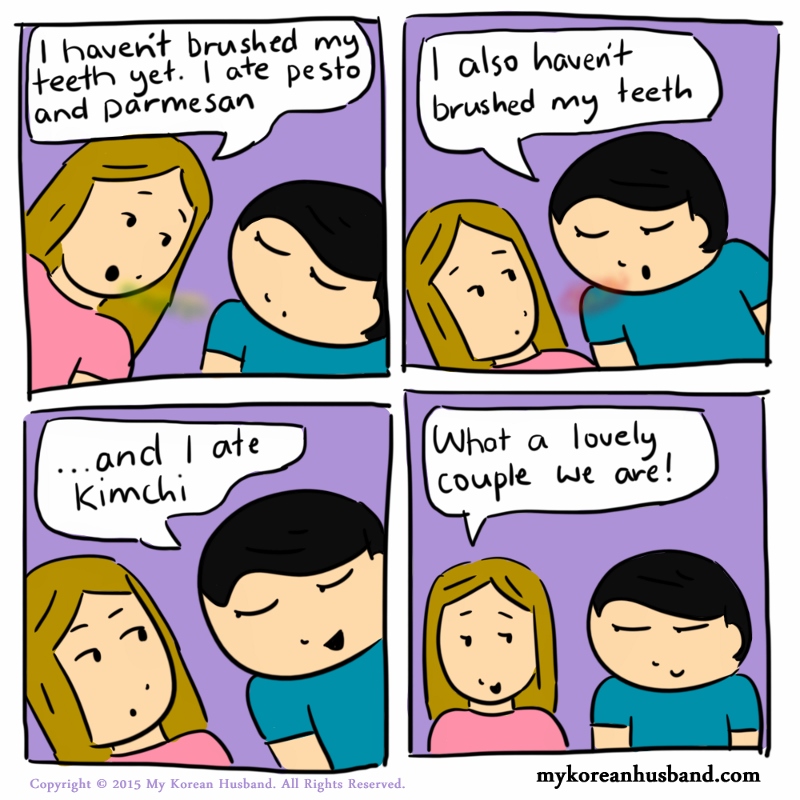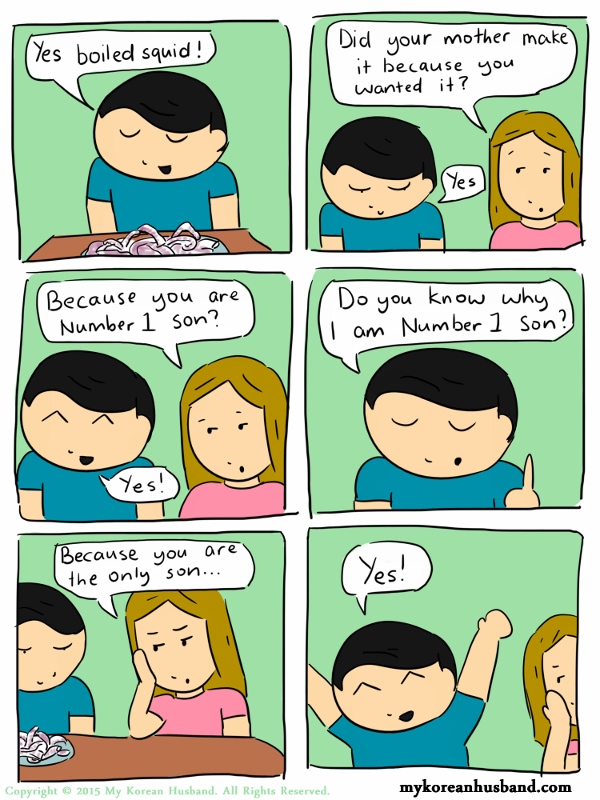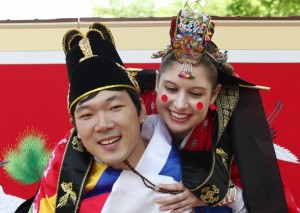In this video we talk about different types of aegyo, why it’s so much more than gwiyomi and how our relationship has changed in regards to aegyo since we moved to Korea.
Month: January 2015 (Page 2 of 5)
The problem with working at home is that your morning routine kinda blends with your work, checking emails while eating breakfast, moving onto other work and realising you haven’t even brushed your teeth yet.
My inlaws hate the smell of my basil pesto and Parmesan cheese. It’s interesting to be the foreigner with the stinky food..
(We did go brush our teeth after this moment).
What strong smelling food do you have in your country?
In this week’s Commenting on Comments we talk about the TV show “Return of Superman” and Choco Pies and Zoolander and we open a package!
Hierarchy in Korean families is much more obvious. I always wonder what Hugh would be like if he had a brother older than him, or even one younger than him. He only has one younger sister (who he is very bossy to).
I’m the eldest out of my siblings but it doesn’t mean much in Australian culture. I never really feel older or that I have any power over my siblings.
Being the only son of course automatically means he is “Number 1 Son” which is a position in Korean society that has a lot of benefits and it’s normal for his mother to dote on him. So when he wants to eat something in particular – he gets it! I notice a big drop in the quality and quantity of dinner when he is not at home. When he goes out with friends, his mother doesn’t bother too much and we just eat ramen or some rice and side dishes. Sometimes it bothers me that his parents don’t eat as well when he isn’t there because I think they deserve nice food as well, and need to look after their health. But it’s so normal here for parents to put their children first. Even their adult married sons.
This is a video just for those that were watching the Korean drama Modern Farmer! We talk about the final episode and the series as a whole.
There are lots more things to talk about, so for those wanting to discuss it, feel free to talk about it here, or over in the comment section on YouTube.
It’s been hard to vlog lately. We have just been working away inside and the weather has been terrible. We braved the cold winds to go for a walk today.
We also put a video up of Simon and Martina’s cat Meemers, for all your cat lovers.
This blog post has been a long time coming and we actually made a video about this but have never uploaded it because we don’t want to offend people or be too polarizing.
For those that don’t know, AMWF stands for Asian Male White Female. We are indeed an Asian male and a White female but we don’t identify with that label or those tags when used online.
Our blog has always been about culture rather than what we look like. Labels like ‘Asian’ and ‘White’ are such large labels and contain many different cultures within them, so they end up mostly referring how someone looks. We’ve never been about that. In fact, I could be Asian Australian and we could still have the exact same cultural differences. Hugh could be of Korean ethnicity but have grown up in the same town as me and share the same Australian cultural identity, yet we would still fall under the AMWF tag. We have always highlighted the contrast of culture and trying to understand each other as an important aspect of the blog and YouTube channel.
When we first started the blog I never even thought to label ourselves that and it was only later that I discovered that these tags were used. My motivation was to simply share our life and the cultural differences we faced in a humorous and thoughtful way.
Hugh’s cultural identity as Korean is extremely important to him. He doesn’t like to just be labelled as “Asian” or have Korean culture lumped together in with all these other cultures that can be vastly different. While working in Australia he talked about how it frustrated him when people assumed that he was Chinese or Japanese just because he is Asian. He hated to have his nationality and cultural identity disregarded so easily like that. So when it came to the blog, we knew from the start it was important to show that he is a Korean man. The same way that now, as we live in Korea, I don’t particularly love being called American just because I am a white person. Even when people are corrected and told that I am actually Australian, their response is often, “Same thing.” For both of us, our nationalities are an important part of our identity. If we took a poll of what nationalities AMWF stood for, I don’t think Korean and Australian are necessarily the first ones that come to people’s minds. Another aspect of reducing our very real relationship to an internet tag or title is the uncomfortable way it resembles a porn tag, or fetish.
The benefits of using such tags are perhaps fitting right into an already established community and an easy way to find people who are perhaps like-minded. For me the tags seem too inclusive but at the same time too exclusive. There are many cultures within the term “Asian” and “White” so culturally it doesn’t mean that we necessarily fit into them. At the same time, AMWF is also excluding people of colour and gender who do actually have a relationship impacted by cultural differences. For example, letting go of such tags allows for non-White women (and men) with Asian partners join in communities and online sharing and to not feel excluded because of a tag.
On a more personal note, I feel that sometimes certain tags and titles diminish the sincerity of international couples. In the past year there have been many blogs popping up talking about and showing international and/or interracial relationships and perhaps there are many people currently contemplating starting one themselves. I think it’s good to always evaluate your motivations, ethics and priorities when you start blogging and what you want to present to the world.
I think there can still be times where it’s appropriate to talk about Asian men and White females, for example, representation in Hollywood films and the de-sexualization of Asian men in Western media, or the portrayal of White women in Asian media, but for us that’s not what our blog is about. It’s just about us.
Update: I also wanted to share what Sophie has also said about this issue. Sophie who has also done some blog posts here, and has been in some videos and is a good friend of mine.
I know labels like AMWF seem quite innocent, but as couples who come under this broad category, we also have a responsibility to think critically about what these labels say about us and whether we are okay with that. It can be very uncomfortable to have someone challenge a term we have latched onto, especially because I am sure most people don’t have any ill intent in using such tags. I think it is valuable to acknowledge the cultural differences in a bicultural, international marriage and personally, in my marriage we can recognise that we look different without this being a defining issue. We want to be normal members of society, accepted in Korea and Australia with barely a shrug.
For me, AMWF turns us into a side show, and reinforces negative stereotypes like “White women aren’t into Asian men” and therefore a narrative where I am a benevolent white woman who has been kind enough to take up a relationship with an unwanted or exotic ‘Asian’ man.
We all grow and change in our views, I’m sure when I was younger this tag wouldn’t have bothered me at all, but now I am a mother and have to deal with a new set of questionable categories like ‘half caste’ ‘half asian’ ‘halfie’ ‘biracial’ and figure out how to help my daughter navigate issues of identity and race. (For me, she is both 100% Korean and 100% Australian in every cell and each strand of her DNA) I wonder how I would feel if she went to school and described her parents as “AMWF” ..or if her friends used that term toward her.
I recognise shared experience is quite important to people in international relationships because we often feel like we are drifting into uncharted waters as we come upon new challenges due to cultural expectations, language, visas and other logistics. For me, this means I am always happy to connect with people who are married to Korean nationals, whether they are also Korean, or from whatever culture they come, but I disagree with the term AMWF.





Recent Comments